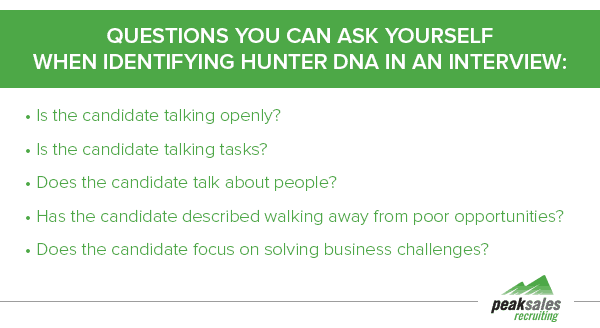To execute your hiring strategy and achieve your sales targets, you need the right sales talent. Here are 14 strategies you can use to ensure you hire the right salespeople for your company.
There is a robust business need for objective sales hiring. Creating strategies to hire salespeople who will hit quota and deliver revenue is critical. Simply put, you need to build a team that will help you reach your sales goals.
Here are 14 sales recruiting strategies to make your hiring process more effective:
1. Build Ideal Candidate Profiles to Match the Requirements of Your Sales Strategy
One of the biggest issues in the hiring process arises when leaders haven’t defined what they need from their salespeople. Do you need a hunter who can penetrate the market and close net-new business? Or a lead nurturer who can close warm leads? Or how about someone to overtake and farm existing accounts?
Create a clear outline of the ideal candidate’s skills, experience, and DNA. Your job description and recruitment efforts can be built around this outline.
Key traits of your ideal candidate can include:
- Behaviors required to sell to your client
- Attitudes required for best fit for role and best cultural fit
- Skill set necessary to excel in your selling environment
- Personality characteristics like competitiveness, resilience, conscientiousness, persistence, or drive
2. Showcase Your Company as an Employer of Choice
Top performing sales professionals are picky when it comes to choosing who they work for. And they should be: they have the luxury of working for the best because they are the best at what they do.
Some tactics for attracting the right candidates to your company include:
- Online – this is likely the first place that potential candidates will look, so make sure your website is professional and the content is up to date.
- Offices – make sure your offices look like a place where success is celebrated and sales results are expected. If your company is remote, make sure your virtual presence is equally as professional.
- Interactions – when speaking with candidates, discuss marquee customers you’ve done business with. This demonstrates the value of your customer relationships which top sellers want to see.
- Reputation – Hire the best and your company will become known for attracting high performers.
3. Stop Relying on Job Boards
Top performing salespeople are too busy closing deals to browse job boards. Active candidates on job boards are ones who are out of work or at risk of being laid off for poor performance.
Using a job board can increase your time-to-hire and average annual turnover. Instead, leverage your employee’s existing networks.
4. Use Cash to Attract Top Candidates
A secret in talent acquisition is that great salespeople know other great salespeople. It is because networking and relationship building are critical for success in sales. Existing reps with the right expertise will likely know other strong candidates.
To leverage your sales force’s personal network, create an internal referral program. Make this program lucrative. Offer crash rewards when an employee’s referral is hired and hits their sales quota.
Salespeople are motivated by money. Incentivize them to bring the talented people they know to you. This is a great way to foster top performance and a thriving team environment.
5. Build a Strong Employer Brand
Potential employees assess the brand of a company before applying for or accepting a job. They will research you as much as you’re researching them. Ensure they are wowed while they are researching your company online.
To attract top performing salespeople, there are several things you can do. When it comes to your online employer brand, be sure to position your company as a market leader. Top salespeople are always interested in working for industry leaders or high-growth companies. Feature key client logos in the recruiting process to show your legitimacy. By emphasizing your reputation and resources, you gain the attention of top talent.
Understanding employee branding and sales culture is where employee engagement begins. Engage talent on your website from the first point of contact. Do this by showcasing:
- Core company values
- Testimonials of how your all-star sales team is living your values
- Success stories of personal growth, promotion, or role expansion
- Stories of your current team’s capabilities
- Employee awards and recognition
- Blogs written by employees about their professional engagement
Make potential candidates feel like they know you by personalizing your company brand. This is a crucial first step to creating a connection with your target candidate pool.
6. Attract Top Performers With Your Company
If you must publish an online job ad, be strategic about what it is you’re actually selling. Many job descriptions are identical, yet some companies receive hundreds of resumes while others get none.
If you focus on what a candidate has to gain by working at your company, not what they will do, you won’t have to rely on the job description for candidate flow. The best job descriptions include compelling stories about client relationships and key accounts. Or, include personal stories about the beginnings of your sales force and how it has grown and evolved the company. The best salespeople seek challenging and innovative sales environments. Showcase how your company creates this in your job descriptions.
7. Interview for Sales DNA
Don’t interview based on generic hiring criteria. Instead, include the Sales DNA of candidates from the first point of contact. Peak’s research has found that knowing how to interview for sales DNA is one of the keys to successful sales hiring.
Sales DNA refers to the traits a candidate possesses that will make them successful. Sales DNA is different from sales skills. You can test candidates during the interview process by asking specific questions once this DNA is identified.
8. Introduce Science To Your Recruitment Process
Effective hiring leverages the power of science. One way to introduce science into your sales hiring process is by using psychometric testing to assess sales candidates. This tool helps you objectively assess candidates’ communication and behavioral style. Its purpose is to predict the behavior, performance, and motivating factors of an individual in a specific context.
Typically, psychometric assessments measure:
- Aptitude
- Mental cognition capabilities
- Behavioral skill sets
- Motivating factors
The results will help you decide which candidate will fit into your team culture best. It will also give insight into how they will respond to customer needs.
Psychometric testing is key to understanding if someone has the persistence to sell. It’s an objective tool that can be an important part of hiring the right people.
9. Don’t Overvalue the Resume
Resumes are not the best source of information about how a candidate might perform in a given role. They should not play a large part in any hiring decision. Resumes can confirm factual information but fail to provide more insight. Resume contents do not directly correlate with strong performance. Hiring managers should review other sources of information, in addition to a resume, when making a hiring decision.
10. Assess for Criteria Other Than Experience
Many managers will prioritize experience within the industry as a key criteria when hiring. However, according to a Harvard Business Review study there is “zero evidence that applicants with more industry experience will be better employees” (HBR, Alison Beard, 2019). Particular industry experience can be important, but evaluating only on experience is a mistake. In the context of selling, experience is a multidimensional attribute. It may refer to:
- Customer group
- Technology
- Territory
- Division of the selling organization
Your selling model, sales environment, and company culture aren’t transferable from a previous role. Experience selling a similar product also doesn’t guarantee success. Don’t simply rely on experience in your assessment process – have a process for how to hire the best salespeople. There are other important factors that shouldn’t be overlooked.
11. Start Conducting Exit Interviews
Creating effective exit interviews can help create lifelong advocates for an organization. They provide invaluable information about your sales leadership’s effectiveness. Exit interviews can help you:
- Lower turnover rates
- Understand leadership gaps
- Reduce the cost of sales turnover
Creating ambassadors can come from effective exit interviews to understand employee experiences. Employees regularly leave company reviews on sites like Glassdoor.com after their tenure at a company. When they feel heard and understood, they are more likely to give approving reviews. When past employees leave positive reviews of your company, you end up with a channel of organic online content about your company.
12. Get HR the Sales Tools They Need
HR Should be a key player in executing your hiring strategy. But for HR to help you find your new salesperson, it’s up to the VP of Sales to communicate their needs. What type of seller do they need (hunter/farmer)? What type of selling experience is necessary for the role? The cultural fit required for success in the selling organization?
You can provide further guidance for recruiters about how the sales organization functions. Especially in the areas of:
- Team performance
- Culture
- Hiring timelines and ideal profiles
- Compensation plans
- Individual development plans
Foster your relationship with HR and help them understand your needs to grow a strong team. This way HR can more effectively do their job.
13. Make Your Compensation Plan the Best in the Industry
Salespeople generally have a larger appetite for risk than other workers. A pay plan that offers rewards based on risk appeals to most salespeople. Make the rewards you give for sales performance a clear part of your sales hiring strategy.
The best compensation plans are simple. They provide above market pay and reward the high achievers. They align with sales cycle predictability. The less predictable the sales cycle, the lower commission is and higher base. To attract high-quality candidates, you need to provide a high quality compensation package. As well, new reps should be aware of the potential for internal promotions to become future leaders.
“Sales reps work harder for the chance to earn a reward than they do after receiving one.”
– Doug J. Chung, professor of marketing at Harvard Business School
14. Make Retention Efforts Proactive
World-class sales organizations don’t think of retention efforts in “one size fits all” terms. Instead, they make retention strategies personal. It’s as simple as asking, “what motivates you?” to your new sellers.
It is a given that your reps are motivated by money. However, understanding how to motivate them in other ways can be a huge differentiator in your employee value proposition. Additional motivational factors include:
- Challenging accounts
- Larger/less developed territories
- Personal and professional growth opportunities
- More vacation time
- Workplace flexibility
The first step in retaining your top performers is knowing exactly what will keep them working for you.
Building a Top Performing Sales Team Starts with Your Sales Hiring Strategy
Your sales hiring strategy is the key to building a better sales team. However, poor implementation can result in failure. You can have an excellent strategy, but you need the right people to execute that strategy. If you lack these people then you have a failing business model.
The battle for perfect candidates isn’t ending anytime soon. Increase your odds of winning by using our tips above. With the right hiring strategies, you have all the tools you need to build a top performing sales force.

relpost-thumb-wrapper
close relpost-thumb-wrapper
Latest posts by Eliot Burdett (see all)
- 31 Must-Know Sales Follow-Up Statistics for 2024 Success – December 21, 2023
- 7 Success Characteristics That Define Top Performers – December 19, 2023
- 5 Reasons Your Top Employees Quit (Stop Doing This to Stop Them Leaving) – December 14, 2023





